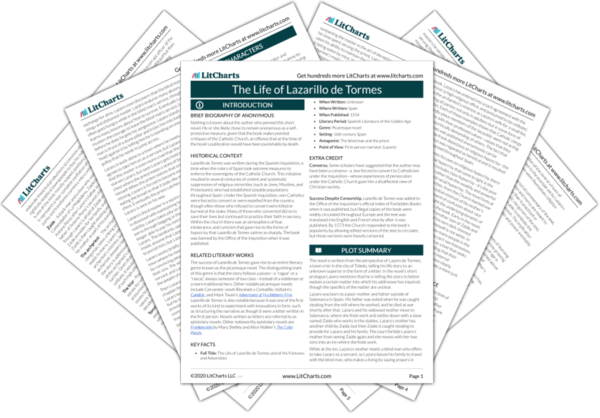Wine plays an important role throughout the book as a symbol of the bittersweet: the entanglement of virtue and vice. As a drink which is sweetly intoxicating and also fermented (and therefore slightly toxic to the body), wine has a dual nature. In keeping with this dual nature, wine gets Lazaro into trouble as often as it saves his life. Although Lazaro is injured badly as a punishment for stealing wine from the blind man, wine is also the disinfectant the blind man uses to wash Lazaro’s wounds afterwards. Most notably, the blind man makes a prophesy that Lazaro will have more to thank wine for than any other man—a prophesy that comes true in the final chapter, when Lazaro has become a town crier who makes his money advertising wines. Here, wine is the source of Lazaro’s livelihood even as his life is a deeply flawed and unlucky one. Wine is present throughout the text as a staple in the lives of poor people, bringing them temporary happiness in a world full of pain—not by providing any lasting solutions to their problems, but rather by numbing them to the pains of their everyday reality.
Wine Quotes in The Life of Lazarillo de Tormes
He put wine on the places where he’d cut my face with the broken jug, and he smiled and said, “What do you think of that, Lazaro? The same thing that got you hurt heals you afterwards and gets you back into shape.”

Unlock explanations and citation info for this and every other The Life of Lazarillo de Tormes quote.
Plus so much more...
Get LitCharts A+“Honestly, I waste more wine washing this boy in one year than I drink myself in two. Lazaro, to put it at its very least you owe more to wine than you do to your own father. He only gave you your being once, whereas wine has brought you to life a thousand times. … I’ll tell you, if there’s anyone in this world to whom wine will be a blessing, it will be you.”












